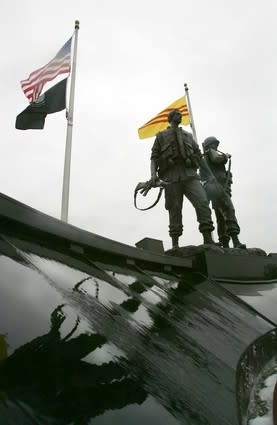Op-Ed: We've learned to thank those who serve, whether it's in war or during a pandemic

In the waning days of April, the number of people who died from COVID-19 in the United States surpassed the tally of those killed in the Vietnam War. The nation has been stunned by the many who have died in this pandemic.
We think of them today, Memorial Day, as we pause to remember and grieve for the nearly 60,000 U.S. service members who died in Vietnam — and the hundreds of thousands of other Americans who gave their lives in other wars.
As the COVID-19 death count continues to mount, it has had a cumulative and numbing effect, much like the counting of war dead. Individual cases disappear into the whole. The focus is on the number, not our fellow citizens.
Many news outlets, including the Los Angeles Times, have sought to put a human face on the COVID-19 tragedy, publishing profiles of some of the deceased, reminding the world what they had done with their lives and what remained for them to do. The remembrances sometimes include heartrending stories of the many family members and friends who were unable to be with their loved ones at the end because of coronavirus-related restrictions.
Just as the COVID-19 dead have likely been undercounted, so have the U.S. military dead in Vietnam. The official number fails to include the many veterans who died after the war as a result of lingering medical and emotional conditions.
And such tallies often don’t acknowledge that as many as 3 million Vietnamese died in that war.
Now, the American generation that suffered most in Vietnam is the most vulnerable to the coronavirus.
If COVID-19 disproportionately strikes the elderly and the vulnerable, the Vietnam War disproportionately killed the young and the vital. More than 60% of the names on the Vietnam Memorial belong to those who were 22 or younger when they died. Members of that once-young baby boomer generation are now senior citizens.
The day before Saigon fell on April 30, 1975, the last two U.S. servicemen died in the Vietnam War. Two Marines, Charles McMahon of Woburn, Mass., and Darwin Judge of Marshalltown, Iowa, were killed in a rocket attack.
Darwin Judge was 19. He had been an Eagle Scout; a high school teacher described him as “rock stable.” Judge had arrived in Vietnam the month before he died.
Charles McMahon had been active in the Boys Club in Woburn where he excelled as a swimmer and taught and mentored young boys. In 1971, he was named the Woburn “Boy of the Year.” He was 21 and died 11 days after arriving in Vietnam.
Twelve Marshalltown natives, from age 19 to 39, died in Vietnam. Ten Woburn residents between the ages of 18 and 29 also died in the war. Had they lived, these 22 men would be among the most vulnerable to COVID-19.
The McMahon and Judge families had to delay saying farewell to their young sons. In the chaos of the U.S. withdrawal, the bodies of the two Marines were left behind. Their remains would not be repatriated for nearly a year.
Many observers have described the struggle against the pandemic as a “war.” The COVID-19 fight is not a war but a public health crisis, striking randomly. The Vietnam War was not random; it was the result of calculated choices.
The COVID-19 and Vietnam eras do share unfortunate similarities, including officials ignoring reports and warnings, and confidently insisting on their capacity to control events. Leaders in the 1960s also assured that we could wage the war without economic sacrifice, and today many insist that we can remain safe while enjoying economic and social freedom.
That war and this pandemic have each been marked by a pronounced inequitable sharing of the burden and the cost by the poor and by racial minorities. And in neither was there official national recognition of this or a pause for national mourning.
In both crises, unspoken politics, personal ambition and arrogance too often have framed public statements as well as military and public health strategy.
Then and now we have seen official optimism and an absence of candor regarding projections of what was to come: “It is over; we have won” echoes from Vietnam to 2020. In April, President Trump said there was “light at the end of the tunnel.” Gen. William Westmoreland reported seeing a similar light in Vietnam in 1967.
There is one lesson American citizens seem to have finally learned, between the Vietnam era and now: to thank in real time those who serve, whether it’s in war or during a pandemic. We need to do that today. And every day.
James Wright, a former Marine, is a historian and president emeritus of Dartmouth College. His most recent book is “Enduring Vietnam: An American Generation and its War.”
